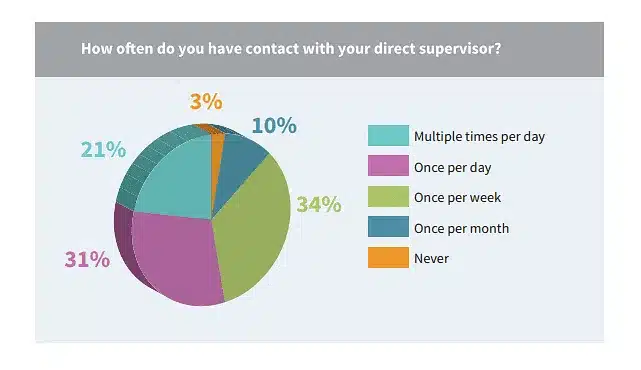Nobody knew that they were ringing in a year-long quarantine and an unofficial working from home myths experiment when they welcomed 2020.
However, the tables have turned in the past few months and now, most of us are working from our living room.
Surprisingly, this forced remote work has not affected the overall productivity of the workforce as opposed to the popular opinion.
In fact, some of the biggest companies have started giving a serious thought to providing their employees with long-term work-from-home benefits.
In May 2020, Twitter announced that it would let its employees work from home “forever” post-pandemic, if they chose to.
Only 2 weeks later, Mark Zuckerberg followed suit and declared that as much as 50% of his workforce could be remote in the next 5 to 10 years.
So, what changed in this lockdown that made the world corporate leaders take notice of the benefits that working from home could bring to the table?
In this article, we explore the reasons why many organizations have decided to embrace working from home in the long run while busting prevalent myths around remote work. Let’s begin!
Debunking 6 working from home myths
Myth #1 : Working from home leads to decreased productivity.
In a study undertaken by Aistasker that covered 1,004 full-time employees across the US including 505 remote workers, it was revealed that those who were working from home led a healthier lifestyle and more importantly, were more productive.
A similar study conducted by Stanford University over a period of 2 years concluded that working from home increased the productivity of employees by 13%.
While remote work does reduce the opportunity of informal bonding of employees with their team, it actually comes as a blessing in disguise.
Now, there are no impromptu coffee breaks, ping-pong competitions or a quick farewell bash to attend in the break room.
On top of it, working from home saves up time spent on daily commutes.
As a result, remote employees spend more time on their tasks, focus better and achieve goals quickly.
Pro tip: If you’re still unsure about tracking the progress of your employees, you could always try different techniques to keep them in loop like virtual standup meetings, setting goals and sending pulse surveys.
Myth #2: Working from home affects company culture adversely
If you look up the definition of company culture, you will find that it means “a set of shared values, goals, attitudes and practices that represent an organization.”
However, the past two decades have instead shown a rise in plush campuses, fun Fridays and the number of bean bags in the office.
A major Working from home myths brings back the focus to what matters most for an organization and its culture – flexibility, work-life balance and happy, committed employees.
As per a survey conducted by Owl labs, 91% of the workers admitted they preferred working from home citing better work -life balance as a reason.
In another survey by FlexJobs, 80% respondents confirmed that they would be more loyal and committed to their employers if they had flexible work options.
These statistics clearly establish that if your vision is to provide your employees with an open and creativity-inducing workplace, then remote work should be on the top of your list.
After all, company culture is more about instilling similar values and mindset in your team and not just about making them follow a certain code of conduct.
However, if you still think that establishing a cohesive company culture with remote employees would be difficult, here are a few tips for you:
- Build a culture of trust. Give your employees ownership while they are more working from home myths but inculcate a sense of accountability.
- Make transparency your company’s core value at every level of decision making and operation.
- Simplify the communication process. Encourage everyone to remain available and be prompt in responses.
- Encourage informal bonding between employees and create opportunities by conducting virtual get-together to help your remote employees break the ice.
Find icebreaker games to build great connect with your remote teams HERE!
- Make sure that your remote employees are recognized, included and are a celebrated part of your team.
- Advise your managers to conduct more and more one on one meetings to get to know their team at a personal level.

Guide to Inculcate Accountability Culture in the Workplace
Myth #3: Working from home causes communication issues
It is the most common misconstrued working from home myths.
And, it is quite understandable why people would think so.
A remote team brings in employees working from different geographical locations and sometimes, even time zones.
But, these are the times of virtual conferencing and global teams.
Even in case of onsite workers, the coordination and task assignment takes place on softwares like Jira and Slack.
As far as being in touch with the direct supervisor is considered, the following survey has a surprising revelation.
According to the survey, 52% of the remote employees ensure that they contact their direct supervisor at least once a day.

We agree that when you have a part of your team working from home, you may miss out on opportunities like a casual chat at the water cooler or a quick update by just walking up to them.
But you could still remain updated with their work, performance and engagement.
In fact, a study by Gallup states that remote workers are 60% to 80% more likely to be engaged than their onsite counterparts.
Virtual Games for Remote Teams
CoffeeConnect connects two people every week based on their interests in slack and helps them build camaraderie easily with ice-breakers questions, rapid-fire quizzes and virtual coffee.
In the long-term, what matters is how engaged and motivated your
employees are whether they’re working from home or from a seat next to you.
With the help of right tech tools, you could easily ensure that the communication channels remain open, clear and conducive for remote work.
Myth #4: Working from home may pose security threat to company data
Cyber security is a major issue plaguing the modern workplace with or without a remote team.
Ensuring that the company’s data remains safe is a bigger responsibility of the IT team and administration than of individual employees.
Investing in VPN and sophisticated authentication measures is a need that cannot be overlooked whether you plan to have a remote team in future or not.
Data security depends more on the awareness of people rather than their geographical location.
You need to educate your teams about the importance of data security and how serious data confidentiality is.
If your team is aware about the value of company data, they will ensure that it remains safe even when they’re working from home myths.
Virtual Games for Remote Teams
CoffeeConnect connects two people every week based on their interests in slack and helps them build camaraderie easily with ice-breakers questions, rapid-fire quizzes and virtual coffee.
Myth #5: The major Working from home myths is that it deters training and development of employees.
There’s an old saying – “out of sight, out of mind”; and it may stand true in a lot of situations but remote work is not one of them.
According to a survey by TalentLMS, 87% of remote workers receive training regularly, out of which 70% of them get it directly from their company.
With the help of online tools, webinars and virtual meetings, providing training to employees who are working from home is as easy as providing them to onsite workers.
In fact, a survey by GoToWebinar revealed that training webinars lock in the highest number of attendance.
And if you ensure that your organization has enough opportunities for remote workers to showcase their leadership qualities and manage bigger responsibilities, their career progression will be a cakewalk.
Myth #6: The biggest Working from home myths is that it increases business cost.
When employees work from home, you need to amp up your IT cost to provide better security.
And that is why people have a notion that it may increase business expenses.
However, the reality happens to be the opposite.
An insurance giant in America named Atena saved a whopping $78 million dollar by letting go of 2.7 million square feet of office space by opting for remote work policy.
Remote work saves your business from sky-rocketing rents, maintenance costs and other overhead expenses.
It could help you prioritize your investments to ventures that could help you expand your business and even provide better perks to your employees.
Closing thoughts
Productivity and results depend upon how engaged, dedicated and focused your employees are and not their location.
The only good repercussion of the coronavirus pandemic has been the affirmation of faith in remote work.
Companies around the world have understood that as long as you provide freedom and opportunities, your employees will keep up their productivity and efficiency even when they’re working from home myths.
All you need to do is trust their commitment and keep them engaged.







